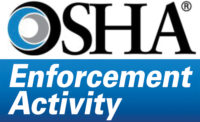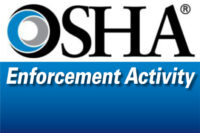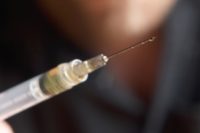Judge upholds citations for bloodborne pathogen, lead exposure hazards at NJ company

 Drivers and loading-dock workers at UniFirst Corp. were exposed to hazards that involved bloodborne pathogens and lead at its West Caldwell, New Jersey, facility, according to an administrative law judge from the independent Occupational Safety and Health Review Commission. On Sept. 30, Administrative Law Judge Carol Baumerich issued a ruling that affirmed all citations and penalties against the company from a 2011 inspection by OSHA.
Drivers and loading-dock workers at UniFirst Corp. were exposed to hazards that involved bloodborne pathogens and lead at its West Caldwell, New Jersey, facility, according to an administrative law judge from the independent Occupational Safety and Health Review Commission. On Sept. 30, Administrative Law Judge Carol Baumerich issued a ruling that affirmed all citations and penalties against the company from a 2011 inspection by OSHA.
Dirty lab coats, contaminated needles
OSHA cited the company for violations of its Bloodborne Pathogens Standard, including failure to conduct proper training and provide Hepatitis B vaccinations to drivers and loading-dock workers. These workers picked up and sorted dirty lab coats and other laundry from customers who regularly drew and/or tested blood. The workers were exposed to lab coats and laundry potentially contaminated with blood or improperly disposed of contaminated needles or syringes mixed in with the laundry. The company was also cited for exposing workers to lead hazards because employees were picking up laundry that had been contaminated with lead. Lead was subsequently found on work surfaces at the facility.
UniFirst contested the citations, and a five-day hearing was held in Newark, New Jersey, beginning on May 22, 2013. Margaret Temple and Andrew Katz from the department's Regional Office of the Solicitor in New York tried the case.
Company intentionally falsified training records
Judge Baumerich found that UniFirst's management routinely and intentionally falsified training sign-in sheets, intentionally required employees to sign training sign-in sheets without receiving training, forged employee signatures and allowed training to be conducted by managers who were not competent in the subjects they taught.
The judge determined that the majority of the company's employees neither received the Hepatitis B vaccine nor signed the form declining the vaccine. In some cases, employees were not given the option to receive the vaccine for months, and in some instances years, upon gaining employment at the facility. The judge also found that the company did not comply with OSHA standards requiring the use of biohazard bags.
Judge Baumerich concluded that employees did not receive training on the hazards of lead exposure until after the OSHA inspection began, although they were potentially exposed to airborne lead before the inspection. She determined that without the proper training, employees would not know that laundry could be contaminated with lead or how to handle potentially contaminated laundry and to wear appropriate personal protective equipment.
UniFirst Corp., based in Wilmington, Massachusetts, has 20 days from the date the administrative law judge's decision is docketed with the Occupational Safety and Health Review Commission to appeal the ruling.
Looking for a reprint of this article?
From high-res PDFs to custom plaques, order your copy today!









